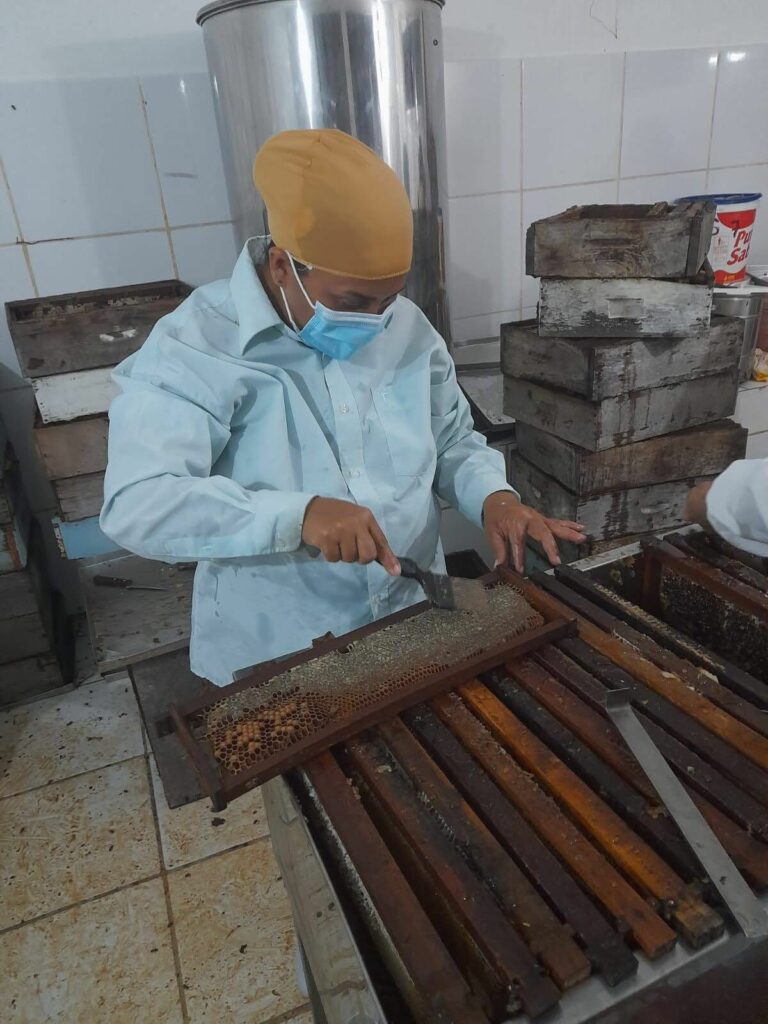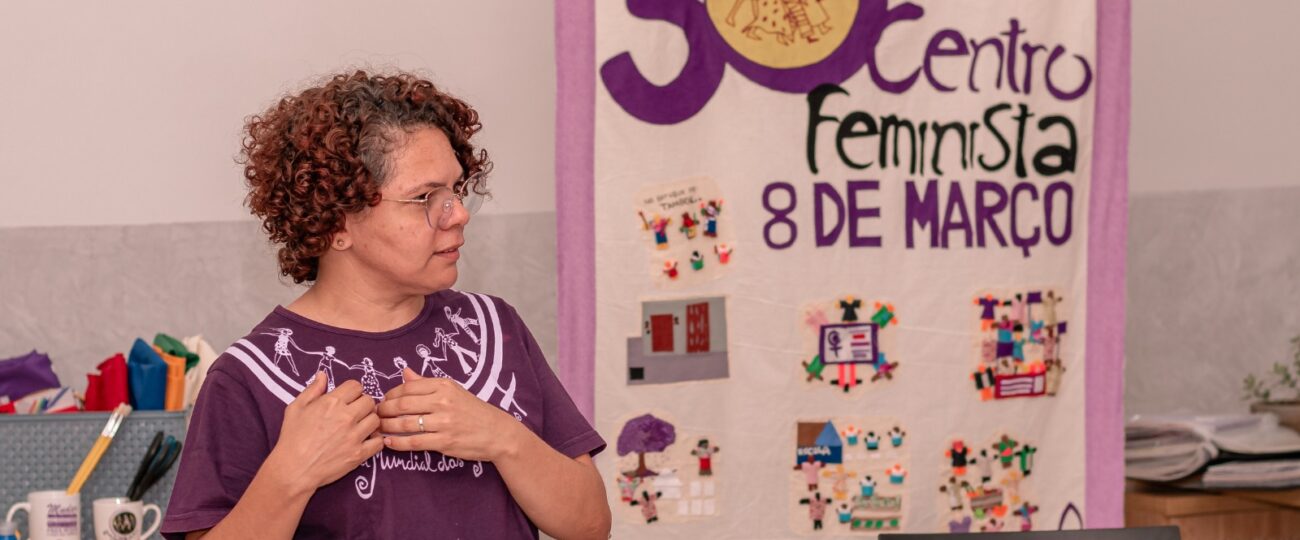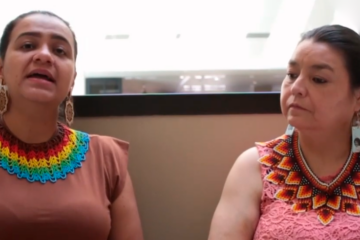Adriana Vieira is a World March of Women militant in Rio Grande do Norte, Brazil. She first became an activist in the rural community where she lived, in the city of Baraúna, taking part in activities with the community council: “I joined a youth group that was organizing the school library and then I joined the rural union. By working with the union, we started to take part in the women’s committee. It was around the time of the mobilization for the first International Action of the March, in 2000.” Adriana took part in every action since then: “My story of struggle is closely connected to the World March of Women.”
In this interview, Adriana addresses the capitalist exploitation of nature, the impacts of that exploitation on women’s lives, and the many strategies women have to defend their territories and biodiversity. You can listen to the full interview in Portuguese below:
How do you see the climate crisis today in Brazil, considering the setbacks of the past six years under putschist and far-right governments? What is necessary to change the predatory relationship with nature?
What we see is actually different names—“climate crisis,” “environmental crisis,” “climate emergency”—for something we should give other names to: exploitation by capitalism, exploitation of nature, and exploitation of life and common goods. Putting it like that, it becomes much easier to understand what this climate crisis means. This has to do with a crisis of capitalism, which needs to profit more, so it needs to create names and even create its own crises.
In Brazil, in the past six years, nature has been hugely handed over and common goods have been privatized, whether forests, the waters—including groundwater—, and water and energy services. Solar and wind energy is considered clean, renewable, and ecological energy, but when we look at that from the perspective of the people who live in the territories where they are implemented, it’s nothing like that. Some plants represent the death of the local biodiversity. It’s also a destruction of culture and different forms of knowledge, because local populations are displaced, and that even happens through great militarization. People cannot move freely, they can’t raise chickens or raise sheep. There is a huge destruction of the environment, especially around the areas where these greenwashed farms are set up.
Other climate-related issues include, for example, the creation of conservation parks, which often also affect the organization of local life. For a long time, traditional, Indigenous, Quilombola, riverside populations, and family farmers have taken care of nature. Even with the destruction driven by capitalism, nature only remains as it is because there is great care being provided by these populations. They take care of the soil when they collect seeds, making sure not to remove all of them, leaving some seeds because the forest needs to rejuvenate, it needs to be born again. When they harvest honey from the bees, women don’t harvest everything, because they consider that the bees need to feed themselves, which is important for them to ensure the continuity of local biodiversity—in some places they even plant again the trees that wind farms have destroyed. In some areas in the Caatinga, women are growing plants again so that the bees can pollinate and increase their honey production. It’s not just a matter of food for women, of getting the honey for yourself, but also keeping the bees alive.
What have grassroots women from the movements and territories been teaching about living with nature and the need for a just transition?

We have recently conducted an activity with a group of women beekeepers in Baraúna, my hometown, and we started to talk about the history of women and groups, and also about the history of the bees. We realized that there is a huge analogy between women’s lives and struggle and the bees’ lives. One sister says we are like the bees: if you mess with one, you mess with everyone. In this analogy, there is also a complementary antagonism, because the bees don’t like noise, the ‘buzz’ affects their organization while they’re working, because they have their own language. So the bees need silence to work and to maintain biodiversity. Meanwhile, we, women, need noise and buzzing to keep life going, to keep ourselves alive. We, women, need to be constantly alert, constantly making noise, constantly raising our voices.
We are part of this biodiversity, therefore it is really important to keep ourselves alive, protected from patriarchal violence and also the violence perpetrated by capitalism, which displaces us, kills us, imposes onto us such a huge load of domestic work that it messes with our health and shortens our lives.
Nature has the ability to teach us, whether through the bees, or through a plant, the weather that breaks, the sun that rises early. There is also an ability that we, women, build by observing nature and learning from it. By learning from it, we build a possibility of care with nature, because nature and biodiversity are taking care of us.
There are several initiatives by international institutions that promote false solutions for the weather and ensure that big companies play a major role in them. How is it possible to tackle this situation? If it isn’t through this path, which is it then?
We in the movements will not believe this fallacy that the solutions are in the big companies. It is our task to make society understand that the solution for this climate crisis is not in big companies, in agribusiness, or in capitalism. We see big disasters connected to the presence of these companies in several places: in Brumadinho, in Alagoas, in the Northeast with wind farms. Big companies destroy because they don’t live in these areas, so they are not concerned about the air, or whether the noise of the wind towers will disturb your sleep, or whether the lights won’t let you concentrate.
The solutions are actually in the territories, whether it’s with the women who are producing honey in Baraúna, in Mossoró, whether it’s with the women who are organizing community kitchens—which involve the whole matter of community gardens, family farming to feed ourselves, while also socializing care work. To us, at the World March of Women, the solution is centered around the territories.
With what feminist agendas and strategies should we start 2024? How can we strengthen grassroots feminism, environmental justice, and food sovereignty in our region and the world?
We have to look at what we have built at the Margaridas’ March in the past two years. We have built a huge process from the territories. Women were looking at their territories, realizing what it means to live a life free of violence, what it means to have food sovereignty—which is not just food security, it’s not just the right to eat, but it includes the right to choose what to eat and the right to choose to eat with no poison. If we look at what the Margaridas’ March has on the agenda, we will have a good horizon not only for 2024, but for the long term. We discuss food sovereignty, the protection of the territories from renewable energy, from mining, from the imposition of carbon credits that ultimately lead to conservation parks that are museums of trees for carbon appropriation. Women have the answer they have built themselves, by sitting down together and discussing in the 27 states of Brazil.
This agenda also points toward possible replications of these ideas and inspirations for the world. For example, our production is close to home, not because women have to take care of the domestic work while also tending to the garden or farm, but because many didn’t have land to grow except around their homes. This policy of productive backyards here in Brazil is a good policy to be implemented in other places where there isn’t much land. There is also the local seeds program, in which we take care of them so that they adapt to the soil and remain alive throughout harvests.
From an economic perspective, some local government procurement initiatives favoring agroecology and prioritizing family farming could be a good inspiration for other places around the world. Everywhere, governments need to procure goods, and family farming and agroecology are everywhere. Connecting government demands with what is being produced from the territories is a good agenda, which builds the possibility of good living, of the sustainability of life through food and agroecology, and it also needs to be connected to the discussion of protecting women from the violence perpetrated by capital and the patriarchy.




